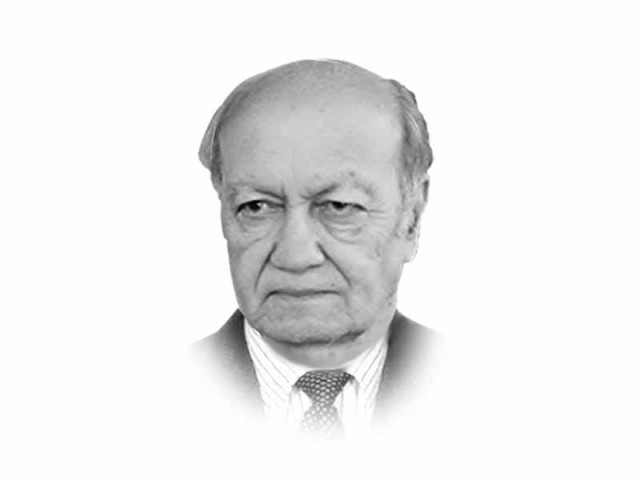Pinning hopes on Naya Pakistan
PTI government has displayed a rare confidence in regard to its relations with the military and the judiciary

The writer is a retired lieutenant general of the Pakistan Army and a former federal secretary. He has also served as chairman of the Pakistan Ordnance Factories Board
Civil-military relations are a complex relationship in the context of Pakistan and have been a major impediment in the way of evolution of Pakistan’s democratisation. History, geography and Pakistan’s geo-strategic position have mostly impacted negatively on its development. Military and bureaucracy that were the most organised and developed institutions at the time of partition have continued to exercise power mostly beyond their constitutional boundaries in the form of direct military rule or through influencing and controlling foreign, security and defence policy.
The very fact that the government spokesperson has to reiterate that civil-military and the political leadership and judiciary hold unanimity of views and are working in harmony reflects the delicate nature of its relationship. However, if this bonding is going to be durable and the relationship is based on institutions exercising power within their constitutional boundaries it would be a qualitative change from the past. Or is it that the civilian leadership conceding power of formulating policy for merely seeking harmonious relations in return? Also mindful its first priority is domestic issues and especially the economy. But in the present-day world the internal and external policies cannot be segregated. Besides, will the foreign policy of the government be a reflection of the thinking and firm views of parliament and the cabinet. Should we expect that parliament and the party in power in consensus with opposition parties would determine our relations with neighbours and world powers? A more fundamental question: is this parliament interested in formulating foreign and defence policies? The two previous governments initially were interested in formulating policy, but gave up when their views ran contrary to that of the establishment.
It is encouraging to hear that there is unanimity of views between civil and military thinking, but as our short history reminds us there have been many an occasion where serious differences occurred especially in the context of relations with India and the US. The point being laboured is have we reached a stage where constitutional parameters are likely to be adhered to? Especially while formulating foreign, security and defence policies and allocating national resources. The final say in a democratic dispensation should be of the civilian government. Or this is not a problem for the PTI leadership and nor expected to arise in future. If this truly happens and the statement was not meant to skirt the issue then it would be a major achievement in the endeavour for the “Naya Pakistan”.
In the “Naya Pakistan” there should be no need to repeat the hackneyed phrases that “we are on the same page”. No democratic country ever uses this terminology nor does it have to convince its people because they are smarter than what our governments might think of them. Moreover, the Constitution demands the supremacy of parliament and not convergence and full consensus on policy issues between the political government and state institutions. Of course, it would be highly desirable and sensible that political leaders give due weightage to the views of the military while formulating policy. And as Imran Khan had indicated he would be using the forum of the National Security Council and other coordinating forums where inputs from the ministers of finance and foreign affairs would also be available.
The chief justice’s announcement that he has formed a judicial committee to review suo-motu powers is another positive development. The greater the clarity regarding the boundaries of state institutions the lesser the confusion and better the governance. Moreover, the emphasis of the government and state institutions should be to improve the normal state functioning and rely less on equipping itself with additional powers or adding endless new organisations. A classic case of this muddled thinking has resulted in the multiplication of police forces in Punjab. Working sometimes at cross purposes as though an island unto themselves. There are expectations from the opposition parties and so far the picture that is emerging is fairly dismal. The PML-N and the PPP seem to be undercutting each other rather than conducting as a mature opposition that commands the respect of the people. They seem more opposed to each other than towards the PTI. A more united and robust opposition could keep the government functioning in check, offer viable alternative policies where needed and strengthen the democratic process. This weakness is attributable to their current internal contradictions and lack of democratic ethos in the party structure. The fear that the leadership would be facing NAB for past misdeeds further colours their behaviour. It is important that the PML -N and the PPP rely more on the young generation of leadership—Hamza, Bilawal and preferably few others but outside the family with unblemished records.
The present government’s top priority is to stabilise the economy and place it on the right course, as it should be. Moreover, it has to be mindful of the reality that a country’s economy is deeply impacted by the policies the government pursues in relations with foreign countries and the extent of convergence and balance that is maintained within state institutions. This has not been our strong point in the past. We hope the Naya Pakistan will be different and herald a better future for the teeming millions.
Published in The Express Tribune, September 12th, 2018.
Like Opinion & Editorial on Facebook, follow @ETOpEd on Twitter to receive all updates on all our daily pieces.















COMMENTS
Comments are moderated and generally will be posted if they are on-topic and not abusive.
For more information, please see our Comments FAQ